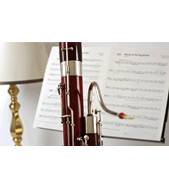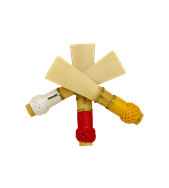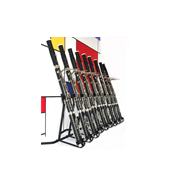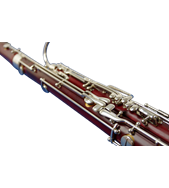Why learn an instrument in the modern world?
June 6th, 2024

Why learn an instrument in the modern world?
Once upon a time, if you wanted lots of music in your life you had to create it yourself.
Your options were composing it yourself or copying and reproducing what you heard others play. All played on rudimentary instruments made by yourself or locally.
With, at first, hand-written sheet music and then printed sheet music, a whole new world opened up. Now you could play music which was more satisfying and varied than that which was available before. Music of varied genres and styles from the far reaches of the known world became available, encompassing music not just from the present but the past as well.
After a while, if you were wealthy enough and lived in the right place, you could listen to others play this music and benefit from their expertise rather than always having to play it yourself from sheet music. But most of us didn’t have the money or live where this music was being performed therefore listening to these experts was only ever a rare treat.
So regular access to music still required that you play it yourself, explaining the ubiquity of pianos and reed organs to be found in millions of homes in the nineteenth and early twentieth centuries.
Then things moved on.
In the twentieth century recorded music became available. Now you could listen to the most expert musicians play a huge variety of music while sitting at home.
Then in the twenty-first century along came smartphones, tablets, YouTube, Spotify and all the rest, giving us access to any kind of music from around the world in an instant.
So why bother to learn to play an instrument now?
Isn’t playing an instrument yourself redundant, going the way of all the other arduous things we used to have to do but now delegate to specialists who can do it better and more cheaply - such as tilling the soil, making our own clothes, milking our own cows, and so forth?
Learning an instrument is hard work and challenging, taking years and thousands of hours of practice. So listening to others on an internet-connected device rather than doing it yourself seems like the ultimate labour-saving decision, freeing up huge amounts of time otherwise spent arduously in a room alone repeatedly playing the same sequences of notes.
Undoubtedly, many have come to this conclusion, with a steady decline in the numbers of people learning to play an instrument in the last couple of decades. This is particularly the case for those instruments which habitually play the most challenging and difficult repertoire such as the bassoon.
Should we all give up, or are there good reasons both for taking up an instrument in the first place and then continuing with it into the future?
I would propose nine reasons for taking up an instrument at any age and then playing it until finally old age forces you to give up. I will be addressing those playing what is broadly termed classical music as this is where the bassoon is generally to be found.
Nine reasons for taking up an instrument at any age:
1. First, from a practical perspective, it challenges the brain, improving memory and staving off mental decline, and so allowing us to continue living a normal, fulfilling life for longer than we otherwise would.
2. Second, it expands our knowledge and insight. Playing a musical instrument isn’t just about the technicalities of fingering and notation – it introduces us to genres, different composers, music theory, history of music, the history and design of your own instrument, cultural history, and many other connected areas of enquiry.
3. Third, an ensemble instrument such as the bassoon brings a social life with like-minded people as it has to necessarily be played with other instruments to gain the full benefit. Whether that be quartets, octets, wind bands or full orchestras, the opportunities are plentiful.
4. Fourth, the challenge of learning to play a piece is hugely satisfying on many levels. Practically, learning to do anything difficult gives satisfaction in itself. And then learning to do something that is not only difficult but worthwhile and deeply enriching provides that much greater satisfaction - there are few things in life which are more satisfying than finally learning to play a great piece of music.
5. Fifth, the appreciation of music is deeply connected to who and what we are as human beings. Music is perhaps more meaningful to us than any other area of human endeavour. Some people try to give evolutionary reasons for this, others make spiritual connections, but whatever the explanation, music seems to be deeply enmeshed with how our brains work and how we conceive ourselves at the deepest level.
Playing an instrument rather than just passively listening to it brings us that much closer to it; it brings us inside the music as it were rather than listening to it from a position on the outside. Perhaps the only way to become even more closely connected to music is to actually compose it. Or maybe to conduct it. But playing is the next best thing.
6. Sixth, playing an instrument can be so meaningful to us that it becomes part of our self identity. One of the articles to which we had the most feedback was entitled ‘Do you identify as a bassoonist?’. So many people wrote to say that they did and why it was important to them. I am also struck by the number of our customers who have the word ‘bassoon’ or the letters ‘bsn’ in their email address, and who also give their bassoons names, such is their connection with the instrument.
7. Seventh, playing an instrument connects us to the composer and time in which it was composed, exposing us to a world-view and culture which would otherwise largely remain alien to us. Similar to the way in which reading Plato, for example, immerses us in the time in which he was writing and opens up a very different way of perceiving ourselves and the world. And the rewards of doing so are just as immense – having the potential to change not just our way of viewing the world but change ourselves as well.
8. Eighth, those who don’t learn to play an instrument, or who tried but gave up, very often deeply regret not having learnt. I am often struck by the weekly piece in the Times entitled My Culture Fix, where well known people answer a fixed set of questions every week. Two of these questions are ‘The instrument I play’ and ‘The instrument I wish I’d learnt’ and they rarely fail to elicit either deep pleasure in the instrument they play or, more often, deep regret at not playing an instrument, or not playing one better.
This should be a lesson to us all – take up an instrument if you don’t currently play one, whatever your age, and encourage others, especially young people, to do the same as the earlier you start the quicker the progress.
9. Ninth, getting to know your instrument and becoming one with it. Each instrument offers different challenges and satisfactions. Those who play the bassoon for example, often say that the things they find most satisfying about playing it are a) the timbre (and bassoonists will pay a lot of money to obtain a bassoon with the timbre they really connect with it is that important to them), and b) the control they can exert over each note or sequence of notes – from breathing and reed control with mouth and lips in combination with the finger control.
The nuances of sound which can be brought out with the finest motor control of the body are immense and help make the bassoonist feel at some deep level at one both with the instrument and the music.
So in conclusion, is it worth learning to play a (classical) instrument such as the bassoon any more, or have advances in technology made it outmoded? I would say that the satisfaction one gains from actually playing an instrument rather than just listening to others doing it is both different and, in many ways, especially at the deepest levels of our psyches, better.
If you would like to take up the bassoon, or take your playing to a higher level, please get in touch. We would love to help. Age or previous experience don’t matter – we have had customers of all ages and musical backgrounds take up the bassoon and make good progress with it.



News and guides


